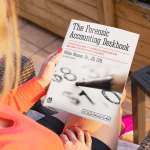Financial Forensic Expert Witnesses Should Know Rules of Evidence Cold

The Forensic Accounting Deskbook by Miles Mason, Sr. JD, CPA, published by the ABA Family Law Section
What is Rule 702 of the Federal Rules of Evidence? For a much more detailed discussion, see The Forensic Accounting Deskbook: A Practical Guide to Financial Investigation and Analysis for Family Lawyers, Second Edition, authored by Miles Mason, Sr. and published by the ABA Family Law Section. This updated edition of one the ABA’s most popular resources explains the practice of forensic accounting and business valuation and how to apply it in family law cases. It provides a practice-focused introduction to the core financial concepts in divorce, such as asset identification, classification, and valuation, income determination, expenses, and more.
See Mason’s complete list of the 10 Big Divorce Financial Mistakes.
VIDEO TRANSCRIPT:
Tracy Coenen: So Miles, let’s talk a little bit about the federal rules of evidence. Can you tell us when those rules would be used?
Miles Mason: Federal rules of evidence are very important. Obviously they’re the rules of evidence that dictate what can or will be admitted as evidence in a federal case. But the federal rules of evidence nationwide are generally the framework, provide the framework and the basis for many of the state’s rules of evidence. And it’s very important for a forensic accountant to have a basic working understanding of several of the important rules that apply to forensic accountants.
Tracy Coenen: So what do the federal rules of evidence say regarding expert witness testimony?
Miles Mason: Well, it’s controlled primarily by Rule 702. And in Rule 702, a court will look at a judge, a judge or court. And when we say judge, we mean court, and vice versa, will look at an expert’s education, training, experience and determine if that expert has the ability to reach a certain level of opinion acceptable for that court. Now there’s a lot of technical terms and verbiage for that that an experienced forensic accountant’s going to know, and we’re going to talk a little bit about the Daubert challenge in a little bit, but basically there’s a certain level of expertise that the court is looking for to be able to testify on a particular matter.
For example, adding two plus two may not require an expert witness, but figuring out the net present value of a future stream of payments just might, depending on the court and what’s the issue. And what we’re looking for in the legal system is that that testimony be based on sufficient relevant facts or data. And also within the court’s analysis or whether it’s going to allow expert witness testimony, the court’s going to look at what’s the methodology? Is it based on reliable, repeatable techniques? And whether or not the expert witness has reliably used those methods or methodology.
Thank you to Tracy Coenen, CPA, CFF for inviting me to join her in this video series. Tracy is a nationally recognized forensic accountant practicing in Milwaukee and Chicago.









